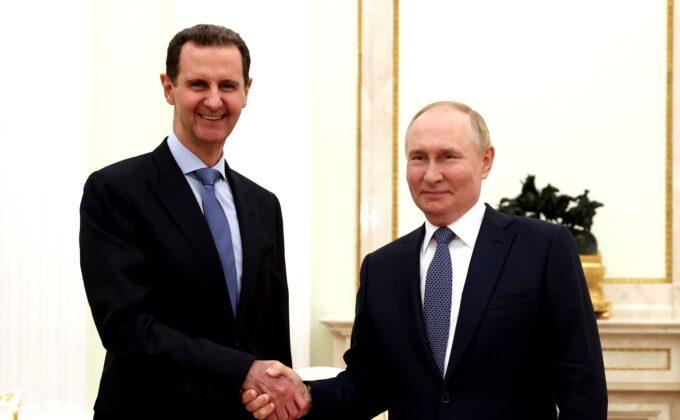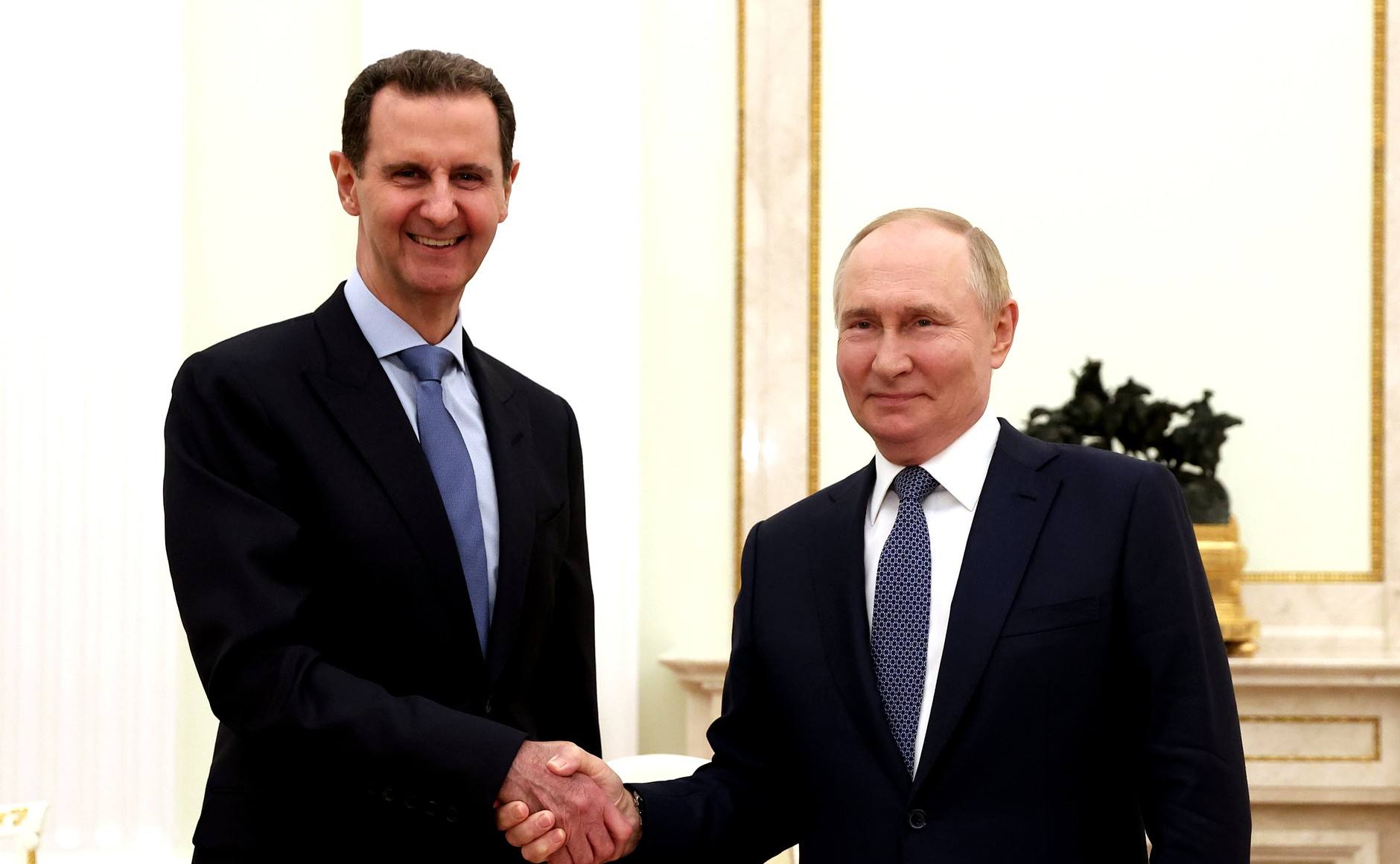






























































Putin meeting with Bashar al-Assad. Photo: Valery Sharifulin, TASS.
The lightning collapse of the Assad government in Syria in recent weeks made it clear that pretty much no one, inside Syria or out, considered this to be a state worth fighting for. It also seemed pretty clear that Turkey (with the probable backing of Israel and the US) had taken the opportunity to use the forces it had been training in Idlib for some years to make a serious power play. The west have long sought to turn Syria into a ‘failed state’ on the Iraq-Libya model, and the new situation has allowed Israel to destroy, almost overnight, the vast bulk of the country’s military installations, and expand its occupation in the South. This is what they have all been working for for thirteen years. What is less clear is the extent to which Russia was in on this move.
The mainstream interpretation is essentially that the latest turn of events is a major blow to Russia. Syria was Russia’s only solid Arab ally, home to its only warm-water naval base (Tartus) as well as a huge airbase (Hmeimim) crucial for its operations in Africa in particular. The ‘loss’ of Syria was therefore a crippling blow to Moscow; a consequence, supposedly, of the Russian army being bogged down in Ukraine and thus unable to commit the necessary military resources to put down the insurrection in Syria.
Combined with the fact that Iran and Hezbollah were also both recovering from Israeli attacks, this created a window of opportunity for the insurgents and their backers to make their move. And it was a window that might have been very brief: Hezbollah could regroup quickly and, if Trump were to honour his promise to immediately impose a peace deal on Ukraine on coming to office, large numbers of Russian forces could be again free to operate in Syria, perhaps within a couple of months.
This is obviously part of the picture. Russia’s options were clearly limited. Any deal it cut would have been made from a position of weakness, at least relative to its position in, say, 2018. But that doesn’t mean no deal was made at all. It is incredibly unlikely, in my view, that Putin would not have been consulted in advance.
Firstly, the risk of large swathes of Turkey’s carefully groomed insurgents being simply wiped out by Russian airstrikes was serious, and both Erdogan and HTS would have sought to avoid this eventuality if at all possible. Even if Putin lacked the capacity to ultimately defeat the uprising, they would certainly have attempted to convince him not to try rather than simply cross their fingers and hope that he didn’t.
Secondly, although it is easy to say in hindsight, this takeover was clearly in the cards for some time. All the fighters from former opposition-held territories retaken by government forces during the war had been pushed into Idlib. There they were joined, in March 2020, by over 20,000 Turkish troops, including special forces, armoured units and light infantry including the 5th Commando Brigade which specialises in paramilitary operations and mountain warfare. They were not there for a picnic; for four years they have been, in plain sight, training and consolidating the insurgent forces to relaunch their insurrection. Russia was obviously aware of this and would have planned for it.
Furthermore, although Russia might have found it difficult to commit large numbers of its own troops to Syria, it could certainly have subsidised the salaries of Syrian army soldiers, which could well have gone some way to mitigating the mundane bread-and-butter defections and passivity within the Syrian army. It chose not to do so, presumably for a reason.
This does not mean, of course, that the whole thing was a Kremlin plot all along, as some are now trying to suggest. One theory claims that Putin, by allowing the Syrian government to fall, has cunningly set a trap for the west, who will now be bogged down trying to stabilise Syria for years to come, just as the Soviets were bogged down in 1980s Afghanistan. But this suggestion makes no sense – the transformation of Syria into a ‘failed state’ has always been the west’s aim, which is why they have backed the most sectarian forces to accomplish it. They achieved this in Libya without getting ‘bogged down;’ they hoped to repeat their success in Syria, and they have now done so. This theory seems to be a desperate clutching of straws by people who simply cannot interpret any event as anything other than a genius plan by the Grand Master.
The truth, I suspect, is rather more nuanced. Here is a working hypothesis: the basic parameters of the HTS takeover of Syria were worked out and agreed in advance by Erdogan, Netanyahu, Putin and Trump. I suspect Trump offered Putin a straight swap – Syria for eastern Ukraine; with the caveat that Russia could keep its Syrian bases. This was acceptable to Putin for several reasons.
Firstly, obviously, eastern Ukraine is his priority. Secondly, his only real concern in Syria was those bases, anyway. He may well have come round to the west’s ‘Divide and Ruin’ strategy – essentially, that it is easier and cheaper to secure your specific assets (bases, mines, oil wells etc) in a failed state using local militias, private security and/or your own armed forces than it is to secure an entire state to do so for you. Thirdly, Assad had, by all accounts, not been fully playing ball with Russia, and had been unwilling to turn Syria into the pure vassal state that Putin was demanding, making himself less valuable and more expendable in so doing. Fourth, Russia’s ultimate goal to take over patronage from the US of its Middle East client states can only be done by demonstrating Russia’s usefulness to Turkey, Israel and Saudi Arabia. In facilitating the fruition of those states’ thirteen-year regime-change operation in Syria, he has certainly done that, paving the way for (and perhaps already part of) future collaborations and deepening alliances. Fifth, just because Iran is an ‘ally’ of Russia, does not mean Russia wants it to be strong and autonomous. Quite the opposite. Like any imperial power, what Russia seeks are not allies, but dependencies. This latest move has gone a long way to transforming Iran from a Russian ally to a Russian dependency.
Cutting off Iran from the resistance in Lebanon and Gaza is no bad thing from Russia’s point of view: partly because Iran’s patronage of those groups acts as a source of power and autonomy for Iran, giving it some kind of ‘deterrence’ independent of the Russian defensive umbrella. If the resistance is cut off and neutered, Iran’s only source of deterrence (other than its own, admittedly formidable but nonetheless heavily Russian-reliant, defences) is Russia. And popular, autonomous, working-class resistance militias (such as Hamas, Hezbollah and the Houthis) are a nuisance for any imperial power anyway, a constant potential spanner-in-the-works to any colonial carve-up agreed by the Big Men.
And finally, of course, as discussed above, Putin’s options were limited; he could certainly have slowed the rebel advance but it is unclear whether he could have defeated it, and even the attempt to do so would have entailed some, potentially quite significant, diversion of manpower from the war on Ukraine. With limited options available, a deal that allowed him to keep eastern Ukraine and his Syrian bases would have likely seemed like the best available.
Claims that the latest events are a huge blow to Russia are therefore overstated. In strategic terms, if the bases are maintained, nothing has really been lost, other than a tedious responsibility to maintain an unpopular and disobedient client. And, in the longer-term, regional picture, much may have been gained, as suggested above.
The other argument often made is that this is a blow to Russian ‘prestige,’ that its ‘stock’ as a power willing and able to defend its allies will have been reduced significantly. A report from the Institute for the Study of War published shortly before the fall of Damascus, for example, claims that “Assad’s collapse would damage the global perception of Russia as an effective partner and protector, potentially threatening Russia’s partnerships with African autocrats and its resulting economic, military, and political influence in Africa.”
That’s possible, of course. But Putin’s ditching of Assad might in fact send a different message to Putin’s new African friends: “Don’t think you can just do whatever you want and still expect to be protected. Remember you are expendable. We can throw you to the dogs at any moment. And without our support, you won’t last five minutes. Never forget you are not an ally, but a client.” African leaders contemplating any resistance to the full integration of their armies under Russian tutelage may well be chastened by this message, and in a way entirely beneficial to Russian interests.
And whilst it is true that EU leaders are now demanding that HTS kick out the Russians, the truth is that it is not really the EU’s opinion that matters, but Trump’s. Let’s see what he says on the matter; and more importantly, what he does.
The post Did Putin Make a Deal Over Syria? appeared first on CounterPunch.org.
This post was originally published on CounterPunch.org.